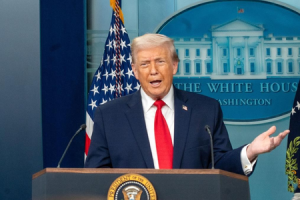Is the Biden-Netanyahu relationship repairable or at a breaking point?
U.S.-Israel ties strained as Biden halts delivery of heavy bombs to country.

President Joe Biden and Israeli Prime Minister Benjamin Netanyahu have always had a complex relationship, but recent events have put their dynamic under intense scrutiny. As the situation in Gaza continues to escalate, their differing views on how to handle the conflict are becoming increasingly visible. And with both leaders facing their own political challenges, the tension between them has reached a breaking point.
Biden has always prided himself on being able to manage Netanyahu with diplomacy and persuasion, rather than resorting to harsh measures. However, as their disagreements have become more pronounced in the past few months, it is clear that this approach may no longer be effective. Netanyahu, on the other hand, seems determined to push ahead with his plans, brushing off Biden's warnings and declaring that he is prepared to stand alone if necessary.
The most recent source of contention between the two leaders is the potential for a widescale operation in the southern Gaza city of Rafah. Biden has made it clear that if Israel proceeds with this operation, he will withhold the delivery of heavy weaponry, and may even suspend the provision of other weapons. In a recent interview, he expressed his concerns and differences with Netanyahu in no uncertain terms.
Despite these tensions, Biden's team insists that he is not willing to let the relationship between the US and Israel deteriorate any further. They recognize the political importance of maintaining a strong alliance with Israel, not only in terms of public opinion, but also due to Biden's personal history and his belief in Israel's right to defend itself. However, as pro-Palestinian protests continue to rock the country and even Democratic strongholds like college campuses, some fear that Biden may be the last president to hold such a pro-Israel stance.
Yet, the White House's optimism about their ability to handle Netanyahu may be misguided. Many American presidents have found themselves at odds with the Israeli leader in the past, and it remains to be seen how this latest rift will be resolved. One thing is for sure, the relationship between Biden and Netanyahu has been tested before, and it will continue to be tested in the future.
Despite their long history, the leaders have had their fair share of disagreements in the past. During the Obama administration, tensions arose over Israel's building of settlements in the West Bank, and later, Netanyahu strongly opposed Biden's efforts to revive the Iran nuclear deal. More recently, Biden urged Netanyahu to de-escalate the violence during Israel's 11-day war with Hamas.
The strain between them was evident earlier this year, when they went over a month without speaking to each other. Biden's frustration with Netanyahu's handling of the humanitarian crisis in Gaza only added to the tension. However, despite their differences, they have always managed to maintain a working relationship.
But now, with the relationship between the two leaders reaching a new level of strain, it is unclear how they will move forward. Netanyahu is facing pressure from the public for a hostage deal, while simultaneously dealing with his hard-line coalition who are pushing for a larger operation in Rafah. He has made it clear that he is willing to move forward with or without a deal for the hostages, which has only further complicated the situation.
In the face of such a complex and volatile situation, it is uncertain how Biden and Netanyahu will navigate their relationship. But one thing is for sure, their diverging views on the Gaza war and their own political futures have left them with little room to maneuver. It remains to be seen how they will handle this current crisis and whether their relationship will emerge unscathed.
The relationship between President Joe Biden and Israeli Prime Minister Benjamin Netanyahu has always been a complex one, but recent events have left them with limited options as their views on the Gaza war continue to diverge. Both leaders are facing political uncertainty, and tensions between them have reached a new low as Biden holds back on delivering heavy bombs to Israel and warns of potential consequences for further military action in Gaza.
Netanyahu, however, seems undeterred by Biden's warnings and has declared that Israel will stand alone if necessary. "We have more than just our fingernails to fight with," he stated confidently. Biden has typically relied on persuasion and diplomacy to manage Netanyahu, but as the situation in the Middle East becomes increasingly volatile and both leaders struggle with domestic issues, Biden has taken a more assertive approach.
During a recent CNN interview, Biden made it clear that he would not supply weapons to Israel if they proceeded with an operation in the city of Rafah, which has been a source of conflict for years. This public statement highlights the growing differences between the two leaders, and Biden's aides have acknowledged that his traditional approach to managing Netanyahu may no longer be effective.
Despite their disagreements, Biden's team remains committed to maintaining a strong relationship with Israel, both for political reasons and out of personal belief in the country's right to defend itself. However, with growing support for Palestinians within the Democratic party and on college campuses, there are concerns that Biden may be the last pro-Israel Democrat in the White House.
While Biden's aides are confident in their ability to manage Netanyahu, they may be falling into the same trap that has plagued previous presidents who have clashed with the Israeli leader. It is unclear how this strained relationship will progress, as Netanyahu faces pressure from both the public and hard-line members of his coalition to take action in Rafah, despite international concerns about the potential consequences for innocent civilians.
Biden and Netanyahu have known each other for decades, with Biden first meeting Netanyahu when he was a young senator and Netanyahu was a senior official in Israel's embassy in Washington. They have faced challenges in their relationship before, particularly during the Obama administration when Biden was vice president. However, with the current tensions between the two leaders at an all-time high, it remains to be seen how they will navigate this difficult situation.
1 Views










